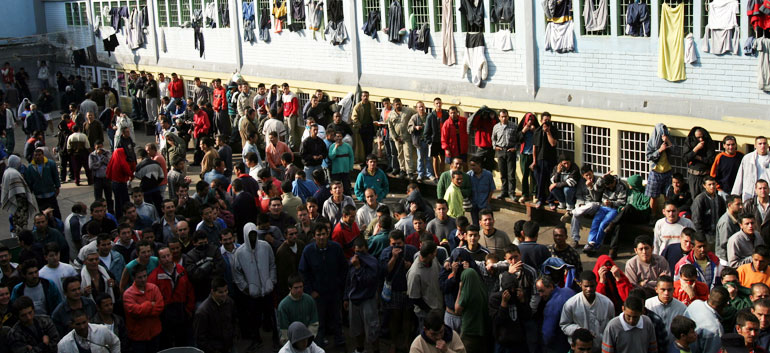The implementation of a controversial reform to Colombia’s Penitentiary Code looks to favor 7,000 to 9,000 of the country’s inmates — who could be freed from prison on parole or house arrest — as well as giving them the opportunity to shorten their sentences, among other benefits.
The state of Colombia’s overcrowded prisons has been at crisis level for years, with the surplus of detainees becoming one of the main topics pressuring Congress to approve the vastly more flexible new code last year with the backing of Colombian President Juan Manuel Santos.
This Tuesday saw the Minister of Justice announce various changes to past policies, including the extension of the maximum sentence for which house arrest could be granted to eight years. Those with sentences of less than four years could see their prison terms wiped, while convicts who have and completed three fifths of their time and stayed within the law could receive the option of leaving prison under probation.
The reform has caused widespread concern over security among Colombian citizens since it was signed off in 2013 due to the possibility of early release for prisoners. Nonetheless, the new regulations are in fact stricter than may be superficially perceived.
MORE: Colombia’s new prison code won’t cause massive prison releases: govt
Colombia’s Inspector General, Ombudsman, general director of the National Police, general director of the National Penitentiary and Prison Institute (INPEC) and High Court magistrates joined the Minster of Justice on Tuesday in explaining the new advances in Law 1709 of 2014.
A reduction or cancellation of sentences will only be an option for those with no prior record and who are serving four years or less. This benefit also excludes all those who are guilty of major crimes, as well as a large variety of lesser crimes including money laundering, conspiracy, extortion, drug-trafficking and crimes against public administration.
In order to qualify for probation, the convict cannot have charges against his name of criminal intent over the past five years.
Those considered for house arrest must be serving a maximum of eight years, have shown good conduct, completed three fifths of their initial sentence and demonstrated that they have a “social and family ties” outside of prison. The convict is usually also required to provide compensation to the victim or to pay a fine.
The granting of such benefits, and their revocation if necessary, will furthermore be at the discretion of the presiding judge.
The new law does not concentrate solely on how the justice system considers punishment, however. The modifications also aim to boost the quality of life within Colomba’s detention centers – which are notoriously poor – and the opportunities available to its inmates.
When the law gets in motion, the presiding judge of any case will be required to ensure the quality of the detention center to which those prosecuted will be sent.
This responsibility will also lie in the hands of a new commission monitoring of the conditions of detainment around the country’s centers.
The infamously inadequate healthcare system in Colombia’s prisons – which is currently run by the public service provider EPS Caprecon — will also see changes happen in the form of a more efficient medical infrastructure and a national health fund subsidized by the state budget.
Studying or teaching is one of the ways in which inmates can reduce their sentence, with the law stating that for every two days of studies, the detainee will get one day less in prison.
Those under house arrest will now receive the same access to work and study resources, while those working will also now be signed up for social protection.
New legislation will also promote a “differential approach” to social minority groups, meaning that within six months there will need to be a system of special consideration for diverse population groups, regarding imprisonment measures and confinement conditions.
In order to tackle Colombia’s stagnating and often lengthy justice system, the reform will impose the need for the National Penitentiary System to install prison rooms in which virtual hearings can take place without the person in question leaving the facility. Doing so would hopefully accelerate the trial process and reduce the risks and costs ensued by the transfer of the prisoner.
In his declaration to the public, the Minister of Justice assured that “there will be no prison release of assassins, rapists, or people who have embezzled public funds,” and that the new measures focus specifically on “dignifying the situation of those held in prisons.”
According to INPEC, the country’s 138 prisons suffer from 58% overcrowding. That is to say that they “house” 120,000, or 44,000 more than their intended capacity.
MORE: Colombian prisoners on hunger strike over overcrowding crisis
State has two years to implement most of these modifications, and attempt to resolve the nation’s prison crisis.
Sources
- Official Law Text (Presidential Office)
- “No habrá excarcelación de asesinos, violadores o personas que hayan depredado al erario público”: Minjusticia (Ministry of Justice)
- Código penitenciario beneficiará a 7.000 presos en Colombia (El Universal)
- Crisis sanitaria en cárcel de Valledupar destapa olla de corrupción (El Tiempo)


